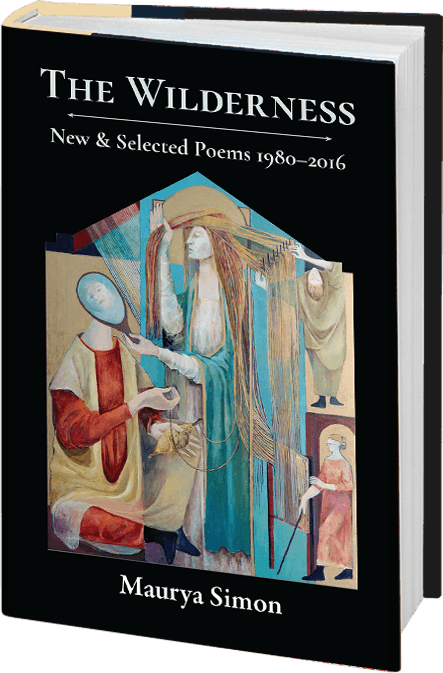Order: Amazon | Barnes & Noble | IndieBound | Books A Million

- Hardcover: 288 pages
- Price: $25.95
- Pub date: April 30, 2018
- Language: English
- ISBN-10: 1597096105
- ISBN-13: 978-1597096102
- Publisher: Red Hen Press (April 30, 2018)
- ph. 626.356.4760 / www.redhen.org
- PO Box 40820, Pasadena, CA 91114
“Maurya Simon’s poetry has always echoed with the most ancient and sacred elements of the natural world, all the while charting the desires, trials, songs, and prayers of those of us who live among its daily, ever-changing drama. The gorgeous music of these poems is cast within a consoling formal calm and elegance, touched always by both wisdom and deep beauty. At times celebratory and at times rendered with a dark clarity, Maurya Simon’s poems resonate with a singular classical and devotional power that distinguishes her from all other of her contemporaries. Treasure this book.”
-David St. John, The Auroras and coeditor of American Hybrid: A Norton Anthology of New Poetry
“Maurya Simon’s language is lush, dense, sensual, and framed by a dazzling intellect. In this her New and Selected Poems, we come to see the full power of her symphonic sweep and the sheer dynamism of her compositional slant–- riffs, play, improvisation, harmonic resonance–- yet the resolve is always there, always a breathless moment. The opening poem has all the profundity of Rumi and the softness of Pablo Neruda. She explores themes of home, habitation, wildness, God, the scriptural erasure of women’s bodies and her subversive reinstatements, a robust love of the word and its various embodiments, and always more, always more. This is her own book of questions, her own gospel. Maurya Simon’s oeuvre is a deliberate world of grace, awe, beauty, delight and wonder. In these poems you will find rest, comfort, deep questions, some discomfort, but always joy. Read this book –you will be grateful for it.”
–Chris Abani, Sanctificum & Hands Washing Water
“The Wilderness, a compendious gathering of new and selected poems, makes clear what readers of hers over the years have increasingly come to feel, that Maurya Simon’s is one of the strongest, most humane, imaginative, compassionate and flat-out brilliant voices of her generation. The sensual immediacy of her vision, her explorations of non-western traditions, and the ease with which she moves between present-day America and other cultural milieus and historical periods—all of this is dazzling. I don’t think she is capable of writing a bad line. Readers of poetry who may have been unfamiliar with Simon’s work up till now should sit up and take notice.”
–Richard Tillinghast, Wayfaring Stranger, Robert Lowell’s Life and Work: Damaged Grandeur, and Poetry and What Is Real
“But what is Simon’s subject? To what does she give “a local habitation and a name”? In a forward to the poems of Joseph Brodsky, W.H. Auden said that Brodsky was “a traditionalist in the sense that he is interested in what most lyric poets in all ages have been interested in, that is, in personal encounters with nature, human artifacts, persons loved or revered, and in reflections upon the human condition, death, and the meaning of existence.” Like Brodsky, Simon has pursued these themes energetically, as her wonderfully moving poem, “Questions My Daughters Asked Me, Answers I Never Gave Them,” which opens The Wilderness, tells us. Offering equally compelling testimony to her dedication and brilliant handling of the great themes is The Golden Labyrinth, her fourth book. This is done in the context of India, where Simon resided during her Fulbright year, where context means mortality not as the subject of some freakish epiphany but as the daily climate of the streets, and suffering not as the occasional suburban tragedy but as the bitter air that fills those streets. In her “encounters with nature,” Simon (who lives high on Mt. Baldy in the Angeles National Forest), is at her best, unusually articulate and informed, a student of the natural world (an entomology major at Berkeley) with a deep understanding of the processes (“the whole heaving universe/ endlessly dancing”) rather than simply the names of flora and fauna as described objects.”
–B.H. Fairchild, (from his introduction to The Wilderness), The Art of the Lathe, Early Occult Memory Systems of the Lower, Local Knowledge, and Usher: Poems
“A poet needs to keep his wilderness alive inside him. One of the prerequisites for remaining a poet after, let’s say, the age of forty or fifty, is an awareness of the wilderness within oneself that will never be domesticated, never tamed. He must never avert his face completely from the terrors of that dark underworld.”
-Stanley Kunitz